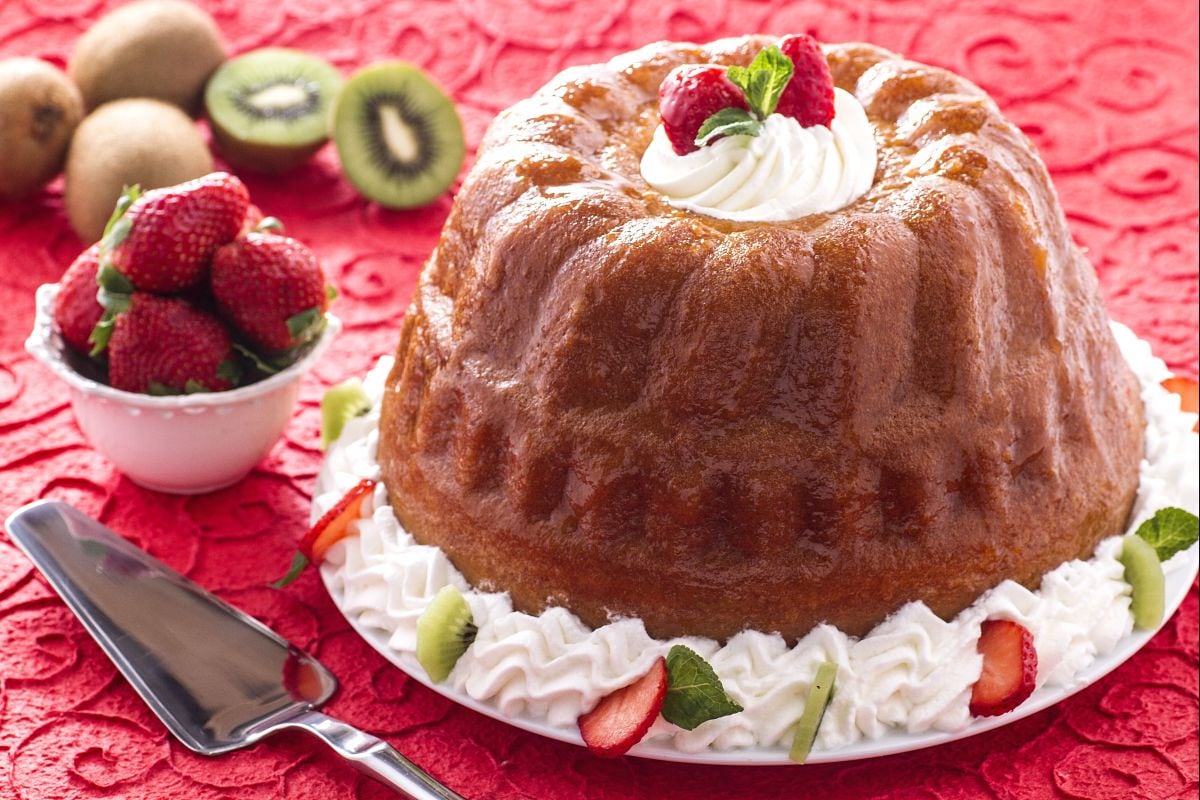Mojito mousse
- Easy
- 60 min

If you want to wow your guests with a dessert that’s not only pretty but also super moist and flavorful, the Savarin is a fantastic choice. Really. This French yeast cake is known for its striking ring shape. Imagine a fancy, oversized donut—all dressed up. It’s got a round dome and a hole in the middle. The dough? It’s similar to babà, but the Savarin recipe makes it softer and more porous, thanks to extra cream and a unique egg mix.
Once baked, it’s soaked in a sweet, rum-flavored syrup that seriously sinks into the cake, making each bite tender and rich with flavor. A shiny coat of apricot jam gives it that really good golden sheen. Topped with swirls of Chantilly cream and a mix of fresh or syrupy fruits, it looks like it belongs at a grand celebration.
The rum-soaked cake has earned its place in classic French baking. And look, it’s perfect for those special dinners where you want to wow your guests. The Savarin mold gives it that main look, and the central hole is more than just decorative—it’s filled with extra Chantilly cream or maybe a fruit salad spiced with maraschino. Which is great. Compared to other classic French desserts, like the well-known Saint Honoré, the Savarin offers a playful twist. Super super delicious.
With endless options for toppings and fillings, it’s both rich and incredibly light, making it a great end to a big meal. Seriously good. Whether you stick to the traditional syrup and cream or experiment with different fruits, the Savarin is a traditional French dessert that's simple, showy, and really delicious. I mean, if you're curious about trying a new dessert or just want to enjoy an easy Savarin recipe at home, this one’s a surefire hit. For real. Easy to make and sure to leave a lasting impression. Enjoy this really good treat and experience a piece of French culinary tradition in your own kitchen.
You might also like:

To prepare the savarin, start by making the starter: warm the milk and dissolve the yeast in it 1 (if you use dry yeast, the dose is 4 grams). Add the dissolved yeast to the flour and knead, with a stand mixer equipped with a dough hook or by hand, the three ingredients 2 until you obtain a smooth dough. Place it in a bowl, covered with plastic wrap 3, and let it rise for 2 hours in a closed oven with the light on, until the dough has doubled in size.

After two hours, prepare the savarin dough: place the starter together with the cream 4 in the bowl of a stand mixer equipped with a paddle attachment (you can also knead everything by hand), half of the total amount of eggs (200 grams), and the flour 6. Turn on the paddle and knead until the ingredients are well combined; at this point, replace the paddle with the hook 6.

While the mixer is running, add a little at a time, alternating, the sugar and a piece of butter, softened at room temperature, at a time (7-8). When the sugar is finished and the butter has been completely incorporated, add the salt 9 and

the remaining eggs, one at a time, waiting to add the next egg when the previous one has been absorbed 10. Knead everything at medium speed for about 40 minutes, until the dough detaches from the sides and is particularly elastic and soft 11. Grease a savarin mold very well, 4 inches high, with a diameter of 8-9 inches and a capacity of 6 cups 12. Pour the dough into the mold,

filling it halfway 13, and let it rise in a switched-off oven with the light on until the savarin reaches the edge of the mold, this will take about 1 hour 14. Bake in a preheated static oven at 350°F for 60 minutes. Unmold the savarin while still warm and let it cool on a wire rack 15.

Meanwhile, prepare the soaking syrup for the savarin: obtain 40 grams of orange zest and 20 grams of lemon zest, preferably untreated 16. Pour the water into a tall, narrow pot, add the sugar 17 and the orange and lemon zests 18.

When the water boils and the sugar is dissolved, turn off the heat and add the rum, so it doesn't evaporate 19, then cover with a lid and let it infuse. Sieve the apricot jam, pressing a little at a time through the mesh of a sieve with the back of a spoon 20, and dilute it with 20 grams of syrup 21 then set aside.

When the savarin has cooled, immerse it in the still warm syrup (about 104°F) on both sides and spoon over the sides so that it is completely soaked (22-23-24).

Let the savarin drain on a wire rack 25 and continue to soak the top, using a ladle 26, to achieve even soaking. Brush the surface of the savarin well with apricot jam to glaze it 27.

Your savarin just needs to be garnished: whip the cream with powdered sugar and with a piping bag, decorate the sides of the savarin with swirls and fill the central hole. Finally, slice a strawberry and the kiwi, place them on the swirls of cream while placing the remaining two strawberries on top and glaze them with apricot jam 29. Your savarin is ready to be served 30: once at the table, cut it into slices and offer it to your guests!